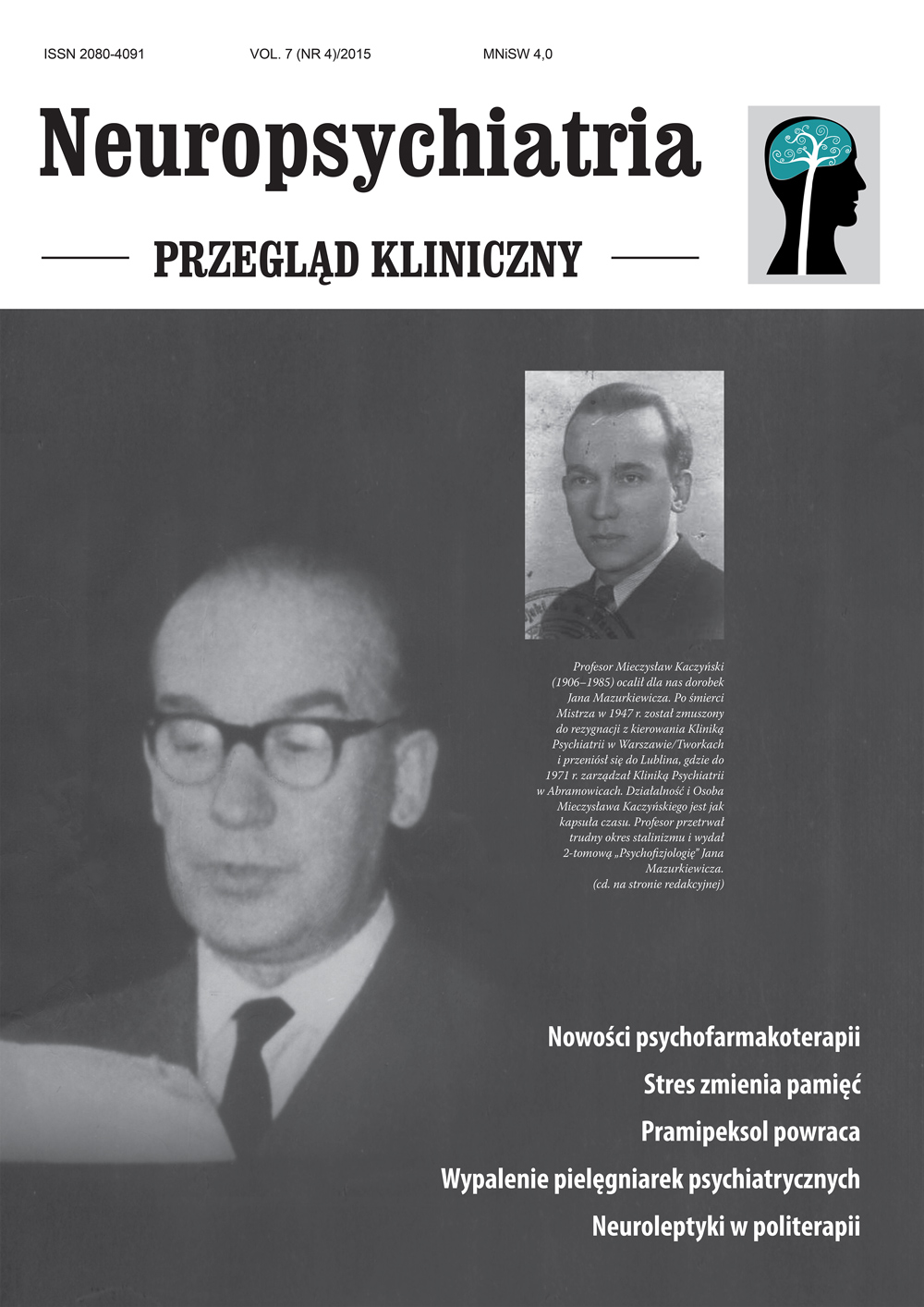Wpływ niewielkiego stresu na funkcjonowanie pamięci autobiograficznej (doniesienie wstępne) Doniesienie wstępne
##plugins.themes.bootstrap3.article.main##
Abstrakt
Pamięć autobiograficzna (PA), czyli część pamięci odnosząca się do osobistej przeszłości jednostki, to zjawisko kształtujące osobowość, a także wpływające m.in. na konstruowanie celów, aktywność i tworzenie planów. W wielu stanach psychopatologicznych pojawiają się zaburzenia PA, takie jak przebłyski i nadmierna generalizacja wspomnień (NGW).
Celem pracy jest ocena wpływu niewielkiego stresu na skłonność do nadmiernnej generalizacji wspomnień. Zbadano 3 grupy chorych po 20 osób. Badane grupy stanowiły osoby hospitalizowane z powodu kamicy żółciowej oraz z przewlekłym zapaleniem trzustki. Użyto 2 grup porównawczych: grupę osób hospitalizowanych z powodu epizodu depresji oraz grupę panelową, czyli zdrowych psychicznie pracowników służby zdrowia, starając się dobrać badanych adekwatnie pod względem wieku i wykształcenia.
Najsilniej różnicowała 3 grupy specyficzność wspomnień. Przy większości cue word (skojarzeń słownych) o pozytywnym wydźwięku emocjonalnym była ona zbliżona i wyższa w grupach badanej i panelowej. Natomiast przy słowach o negatywnym wydźwięku upodabniała się w grupie badanej do osób z epizodem depresji. Nie było różnicy w liczbie odpowiedzi na bodźce o zabarwieniu negatywnym. Znacząca statystycznie była mniejsza liczba odpowiedzi na bodźce o pozytywnym wydźwięku emocjonalnym w grupie osób z depresją.
Potwierdzono dane o wyższej ilości NGW u osób z depresją. Novum pracy stanowiło badanie chorych w sytuacji obciążenia nieznacznym stresem. Przeprowadzono dyskusję o hipotetycznym mechanizmie przywoływania NGW u tych osób jedynie w odpowiedzi na bodźce o negatywnym zabarwieniu emocjonalnym.
##plugins.themes.bootstrap3.article.details##

Utwór dostępny jest na licencji Creative Commons Uznanie autorstwa – Użycie niekomercyjne – Bez utworów zależnych 4.0 Międzynarodowe.
Copyright: © Medical Education sp. z o.o. License allowing third parties to copy and redistribute the material in any medium or format and to remix, transform, and build upon the material, provided the original work is properly cited and states its license.
Address reprint requests to: Medical Education, Marcin Kuźma (marcin.kuzma@mededu.pl)
Bibliografia
2. James W. The principles of psychology. Holt. New York 1890: 670.
3. Rawal A, Rice F. Examining overgeneral autobiographical memory as a risk factor for adolescent depression. J Am Acad Child Adolesc Psychiatry 2012; 51: 518-527.
4. Williams JMG, Barnhofer T, Crane C et al. Autobiographical memory specifity and emotional disorder. Psychol Bull 2007; 133: 122-148.
5. Williams JMG, Broadbent K. Autobiographical memory in suicide attempters. J Abnorm Psychol 1986; 95: 144-149.
6. Rybak AM. Idealizacja przeszłości – różnica w dystrybucji pozytywnych i negatywnych wspomnień na przestrzeni czasu. Przegląd Psychologiczny 2012; 55: 29-40.
7. Fijałkowska A, Gruszczyński W. Organizacja wspomnień emocjonalnych w pamięci autobiograficznej. Psychiatria Pol 2009; 43: 341-351.
8. Gawinecka M, Wojciechowska J, Maruszewski T. Blednięcie \afektywne wspomnień autobiograficznych. Czasopismo Psychologiczne 2009; 15: 43-56.
9. Rzepa T. Jakie wspomnienia i w jaki sposób przywołuje najczęściej nasza pamięć autobiograficzna? Przegląd Psychologiczny 2007; 50: 385-400.
10. Rzepa T, Leoński T. Co zniekształca i wspomaga pamięć autobiograficzną? Opuscula Sociologica 2012; 2: 121-132.
11. Ziółkowska AM. Czy wspomnienia fleszowe są szczególnym rodzajem pamięci autobiograficznej? Przegląd Psychologiczny 2006; 49: 157-173.
12. Rybak A, Wichowicz HM, Żuk K, Dziurkowski M. Pamięć autobiograficzna i jej znaczenie w wybranych zaburzeniach psychicznych. Psych Pol (w druku).
13. Hamilton M. A rating scale for depression. J Neurol Neurosurg Psychiatr 1960; 23: 56-62.
14. Shields AL, Howell RT, Potter JS, Weiss RD. The Michigan Alcoholism Screening Test and its shortened form: a meta-analytic inquiry into score reliability. Subst Use Misuse 2007; 42: 1783-1800.
15. Kuyken W, Dalgleish T. Overgeneral autobiographical memory in adolescents at risk for depression. Memory 2011; 19: 241-250.
16. Clark DM, Teasdale JD. Diurnal variation in clinical depression and accessibility of memories of positive and negative experiences. J Abnorm Psychol 1982; 91: 87-95.
17. Lloyd GG, Lishman WA. Effects of depression on the speed of recall of pleasant and unpleasant experiences. Psychol Med 1975; 5: 173-180.
18. Iqbal Z, Birchwood M, Hemsley D et al. Autobiographical memory and post-psychotic depression in first episode psychosis. Br J Clin Psychol 2004; 43: 97-104.
19. Andersson G, Hesser H, Cima R, Weise C. Autobiographical memory specificity in patients with tinnitus versus patients with depression and normal controls. Cogn Behav Ther 2013; 42: 116-126.
20. Kuyken W, Brewin CR. Autobiographical memory functioning in depression and reports of early abuse. J Abnorm Psychol 1995; 104: 585-591.
21. Harvey AG, Bryant RA, Dang ST. Autobiographical memory in acute stress disorder. J Consult Clin Psychol 1998; 66: 500-506.
22. Giffard B, Viard A, Dayan J et al. Autobiographical memory, self, and stress-related psychiatric disorders: which implications in cancer patients? Neuropsychol Rev 2013; 23: 157-168.
23. Wessel I, Merckelbach H, Dekkers T. Autobiographical memory specificity, intrusive memory, and general memory skills in Dutch-Indonesian survivors of the World War II era. J Trauma Stress 2002; 15: 227-234.
24. Williams JMG. Depression and the specificity of autobiographical memory. W: Rubin DC (red.). Remembering our past: Studies in autobiographical memory. Cambridge, England. Cambridge University Press, Williams 1996; 244-267.

